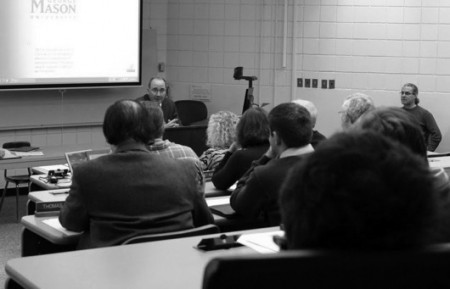
Krasnow Institue Director Jim Olds addresses Faculty Senate members during the Nov. 10 Faculty Senate meeting. Photo By George Yanez.
The George Mason University Faculty Senate met Wednesday to hear reports from several senate committees, approving several additions and amendments. The senate convened at 3 p.m. in Robinson Hall, room B113. The meeting was open to all members of the Mason community.
The assembly began with unanimous approval of the minutes for the last Faculty Senate meeting on Oct. 6. This measure approved a change to the faculty senate bylaws, committing the senate to hold four meetings throughout each semester, allowing scheduling to be done at the senate’s discretion. Previously, the senate was expected to conduct meetings at least once a month throughout the semester.
After the approval of minutes, director of the Krasnow Institute, Jim Olds, presented on the institute’s plans of academic growth and research initiatives. “The Krasnow Institute functions not only as an academic unit but also a place of advanced study,” said Olds. “We are in the process of putting applications forth for two future programs: an MAIS track of Computational Social Science and an MA in Neuroscience.”
Next to speak was Janette Muir, associate professor of New Century College, who presented on behalf of the Academic Policies Committee. An addition was proposed to the Catalog copy concerning final exams, which sought to clarify issues concerning students who have exam schedule conflicts. New language drafted by the committee directs students to consult their instructors to explore other arrangements when those conflicts occur. The senate voted in favor of this change.
“It seems obvious, but many students create a backlog by going straight to the dean or just being unsure about what to do in these circumstances,” Muir said.
The Budget and Resources Committee, represented by psychology professor June Tangney, discussed fiscal concerns for faculty and the university at large. Tangney conveyed planned tuition increases of at least 10 percent for fiscal years 2012 and 2013, followed by a drop-off in increases after fiscal year 2013.
“There are plans to increase financial aid to off set tuition increases,” said Tangney.
Star Muir, associate professor of communication, presented on behalf of the Organizations and Operations Committee, revealing a proposed Code of Ethics. According to Muir, the senate had been receiving pressure from the Board of Visitors to have a Code of Ethics reconciled by the group as a whole. The Faculty Senate ultimately voted in favor of the document as a draft, as long as a preamble is later included.
Vice Provost for Academic Affairs Linda Schwartzstein gave a final presentation on the ongoing plans to improve Enrollment Services. The relocation of several enrollment offices, including the Office of the Registrar’s Office and Financial Aid, to Student Union Building I, were referenced as part of an effort to centralize campus enrollment resources.
“We’re really trying to create Enrollment Central, a centralized location so that we can offer a one-stop-shop to promote efficient services,” Schwartzstein said.






Comments